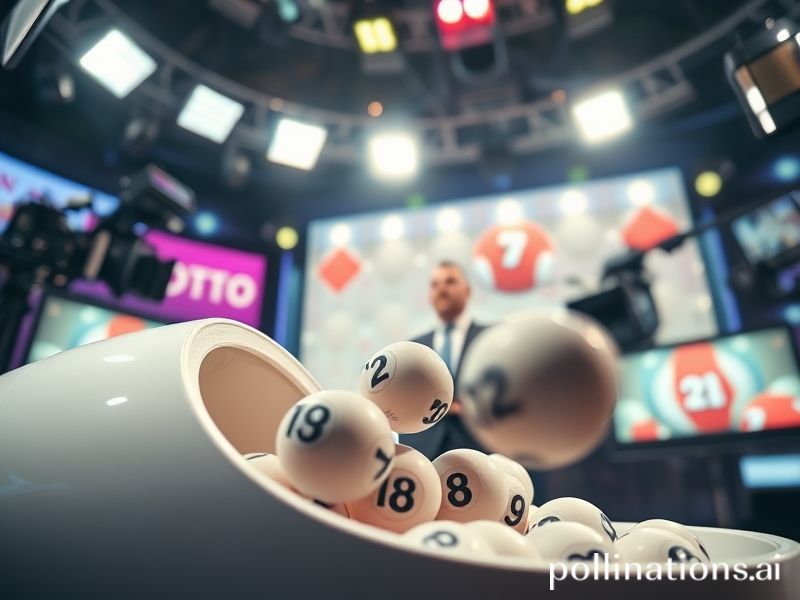Wednesday’s Lotto Numbers Drop: Planet Places 42 Million Fresh Hopes on Six Digits and a Bonus Ball
Wednesday’s lotto numbers are out again—an innocuous string of digits that somehow manages to be the most democratically shared hallucination on the planet. From Manila’s jeepney queues to Reykjavik’s geothermal-heated kiosks, humanity queued up to pay a voluntary tax on hope, and the planet’s eight official time zones obligingly staggered the disappointment so no one felt singled out. The winning sequence—3, 12, 22, 34, 45 and the obligatory “bonus ball” 7—will now be tattooed on exactly three human ankles, printed on two commemorative coffee mugs in São Paulo, and permanently lodged in the nightmares of 42 million other people who swear they were “just one number off.”
This week’s global haul was a tidy €190 million for EuroMillions, ¥1.2 billion for Japan’s Lotto 6, and a Powerball so bloated at $522 million that the U.S. treasury discreetly asked the Fed to print an extra pallet of hundreds “just in case.” Meanwhile, Zimbabwe’s lottery paid out in actual U.S. dollars—an exotic currency more stable than the local kind—proving once again that irony travels faster than inflation.
The international implications, if one squints through the confetti, are geopolitically hilarious. Indonesia’s government quietly increased the excise tax on “sin goods” last month, then watched citizens funnel the same money into legalized gambling marketed as a “social contribution.” In Spain, the Christmas El Gordo—so big it is measured in “decimos” lest anyone grasp how much they’re spending—finances municipal nativity scenes that now include LED camels sponsored by last year’s winners. Even Sweden, that Nordic hall-monitor of virtue, runs Svenska Spel with the same paternalistic smile it uses to sell state booze: “We know you’ll do it anyway, so let’s at least keep the profits Lutheran.”
Scratch a jackpot, and you uncover planetary anxieties. Italy’s SuperEnalotto rolled over 200 times last year because Italians, veteran survivors of austerity, prefer the deferred dream to the immediate tax receipt. In China, where private lotteries are technically banned but scratch cards bloom like sidewalk chrysanthemums, the state uses proceeds to fund sports programs that will someday lose to countries whose athletes eat non-state-approved cereal. And in post-Brexit Britain, Camelot’s falling ticket sales were blamed on “consumer pessimism,” which is economist-speak for “people finally did the math.”
Yet the real stakes lie in the micro-economies of desperation. Nairobi’s shilling-a-line punters pool coins in jam jars labeled “school fees,” while Quebec’s syndicates of civil servants bulk-buy tickets with the solemnity of a NATO procurement meeting. Somewhere in Lagos a boda-boda driver is riding around with the equivalent of two days’ wages tucked in his phone case, waiting for the “sure banker” text from his cousin who knows a guy. The cousin, naturally, is waiting for the same text from him.
Statisticians insist the odds of winning are identical whether you play or not, a line so perfectly bleak it could headline a UN climate report. Still, the ritual persists because it offers the one commodity governments can’t entirely ration: the right to imagine a different life for the price of a cup of coffee. In that sense Wednesday’s results are not numbers at all, but coordinates—latitude and longitude for an alternate universe where the mortgage is paid, the in-laws are impressed, and nobody has to pretend LinkedIn is interesting.
So here we are again, same circus, fresher paint. The jackpots will climb, the confetti cannons will misfire, and the world’s poorest continent will still export more dreams per capita than cobalt. If you didn’t win, console yourself with the knowledge that somewhere a newly minted millionaire is discovering relatives they never knew existed. And if you did win—well, enjoy the complimentary financial adviser who will explain, with a straight face, why your money is safest in a Cayman account named after a shell company that owns another shell company that owns a yacht called “Serenity Now.”
The numbers roll on, indifferent and eternal. Tomorrow the planet will spin, the oceans will rise another millimeter, and somewhere a goat herder in Mongolia will buy a ticket because, hey, Wednesday comes but once a week.







